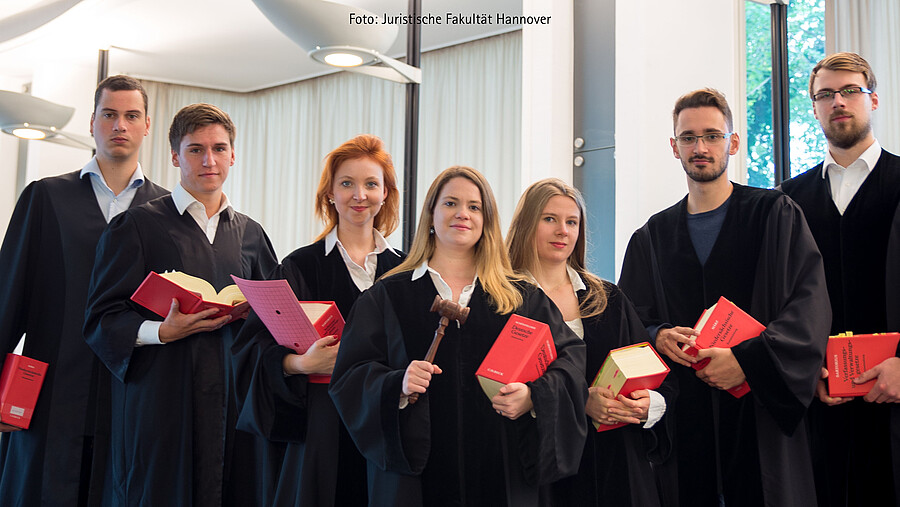Law
(State Examination)
Profile
German HZB: none
International application: German C1
Find out more
Stay abroad possible, but not obligatory.
Short Description
Owing to the wide range of topics involved, the study of Law is a varied, exciting but also challenging programme.
Contrary to all the clichés, students do not simply memorise laws. On the contrary, the study of Law involves combining professional working practices and academic work with everyday events. Did you know, for example, that by enrolling at Leibniz Universität Hannover, a relationship between you and the university is established under public law; or that an entire contract of carriage is concluded simply by getting on a train?
Those who study Law learn to develop an understanding of legal processes and problems, and how to resolve them. To this end, in addition to exploring the three areas of law – Civil Law, Criminal Law and Public Law – they also deal with the legal foundations of legal methodology and legal doctrine as well as areas related to economics and social sciences.
Simulated court proceedings, referred to as moot courts, and lawyer-related additional qualifications enable students at Hannover to gain their first practical experience for their later career whilst at university. In addition, the Faculty of Law offers its students a wide range of e-learning content, i.e. interactive courses that can be taken at home. A free examination review course is also offered.
Course Content
- European and international law
- German law
- Lawyer law and legal practice
- Legal methodology and legal doctrine
- Production of scientific work
The standard period of study of ten semesters is divided into basic studies (generally four semesters) and graduate-level studies, which include the specialisation stage (two semesters), preparation for the examination, and the state examination in the compulsory subject.
The content addressed in basic and graduate-level studies includes not only the three areas of law – Civil Law, Criminal Law and Public Law – but also several basic subjects such as legal methodology and legal doctrine. Students must also gain legal key transferable skills, attend a course in Economics or Social Sciences, and prove their knowledge of a foreign language. In addition, students gain initial practical experience by undertaking three periods of practical training at a court, a solicitor’s office and an administrative body. Once students have completed the state part of the programme, graduates are awarded the title “Diplom-Jurist”.
After graduating, students may decide to undertake two years of legal clerkship and take the Second State Examination if they wish to become a fully qualified lawyer, enabling them to work as a lawyer, judge or state prosecutor.
| Semester | Zivilrecht | Öffentliches Recht | Strafrecht | Nebenfächer |
|---|---|---|---|---|
| 1 | Allgemeiner Teil des BGB | Grundrechte | Allgemeiner Teil | Juristische Methodenlehre Rechtsgeschichte oder Verfassungsgeschichte |
| 2 | Besonderer Teil der vertraglichen Schuldverhältnisse | Staatsorgansiationsrecht | Allgemeiner Teil | |
| 3 | Mobiliarsachenrecht Immobiliarsachenrecht Zivilprozessrecht | Allgemeines Verwaltungsrecht Europarecht | Vermögensdelikte Strafprozessrecht | Wirtschafts- oder Sozialwissenschaften |
| 4 | Familienrecht Erbrecht Handels- und Gesellschaftsrecht Arbeitsrecht Zivilprozessrecht Übung im Bürgerlichen Recht für Fortgeschrittene | Besonderes Verwaltungsrecht Europarecht Verwaltungsprozessrecht | Übung im Strafrecht für Fortgeschrittene Strafprozessrecht | Fremdsprache |
| 5 | Übung im Öffentlichen Recht für Fortgeschrittene | |||
| Schwerpunktstudium | ||||
| 6-10 | Schwerpunktstudium, Prüfung Examinatorien zum Pflichtfach Klausurenkurs | |||
- A distinct feeling for language
- Enjoyment of discussion
- Creativity and ingenuity in order to find good arguments and suitable norms
- Analytical thinking and power of abstraction when reading legal texts and issues
- A talent for drawing logical conclusions
- A keen sense of responsibility
- A keen sense for practical solutions
- Judge
- State prosecutor
- Lawyer
- Administrative lawyer
- In-house lawyer
- Notary public
- Police superintendent
Admission Requirements
The exact admission requirements can be found in the admission regulations:
Application Deadlines
01.06.-15.07. of the year for the winter semester
- First-year students (application for the 1st semester) can only apply for the winter semester.
- Students resuming their studies and transfer students (application for a higher semester) can also apply for the summer semester (December 1st - January 15th).
- Requirements for applications from non-EU countries:
- VPD from uni-assist OR a passed assessment test (Feststellungsprüfung) of a preparatory foundation course (Studienkolleg)
- Applications for the Studienkolleg must be submitted by July 15th.
Law (state examination) - Hannah, Niklas, Mohammad & Patrick talk about their studies
Please note that activating the video will result in the transfer of data to the respective provider. Further information can be found in our privacy policy.
Play video
Do you have questions about studying? We are happy to help!

30167 Hannover

30167 Hannover











